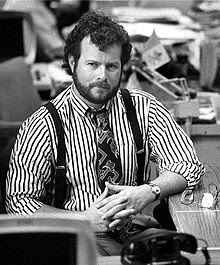Why do people not make films about the AIDS pandemic? Because they can make them about puppies, and horsies, and 3D dance-offs. Just like the government has always done, the film industry generally turns its back on the greatest cultural and medical crisis of the 20th century and likes to basically pretend it's not happening. You didn't even hear the term AIDS in film until the 90's. Reagan didn't even say it on television during his whole 8 year term as president.
Even when And The Band Played On was released in 1993 most of the principal cast in the film took their roles despite the advice of their agents which all discouraged it in fear that it would hurt their respective careers.
There have been a lot of docs that have come out about gay culture in the 70's from Before Stonewall (1984) to Making the Boys (2011) about the seminal Mart Crowley play and subsequent film The Boys in the Band (1970) and also features like Gus Van Sant's Academy Award winning Milk (2008), but no film has ever quite dealt with the AIDS epidemic the way that How to Survive a Plague (2012) does.
I don't think people that grew up in my generation for the most part tend to understand just the level of crisis people were in back in the 70's, and this is why it's important for docs like this to exist. AIDS awareness has always been readily available to us, and we've all had info-sessions on it in schools, not knowing that only decades before people were dropping like flies and no one knew why and when they begged their government for help, the government turned their heads and did absolutely jack squat about it. If AIDS had hit Reagan's friends in Greenwich Connecticut, he would have been on that faster than a fly on shit, but because it concerned primarily the gay community which he at that point had publicly stated that he believed to be a mental disorder, he couldn't care less.
What we now consider as AIDS awareness - lectures, free testing, the AZT cocktail, and even those silly GAP t-shirts were all a result of everyday people that walked the streets and saw less and less of their friends, losing someone to this pandemic every single day, and decided that if the people whose job it was to protect them were doing nothing to do so, then they would take matters into their own hands. It was a long and arduous process but the result of which was light-years beyond anything the Center for Disease Control or the Federal Administration could have accomplished in double that time.
It's beyond important that documentaries like this continue to come out and teach people now, for whom AIDS is not necessarily a death sentence anymore, that once upon a time when it seemed at its most hopeless there were a some unimaginably brave people who refused to accept the Keep Calm and Carry On attitude, and became proactive so that generations later what was once a plague can one day be completely a thing of the past.
Below is the trailer for the film. It is absolutely a must-see.
And below are trailers for some of the other films mentioned in this post:
 |
| Key AIDS activist at the forefront of the ACT UP movement, Peter Staley is prominently featured in the documentary. |
I don't think people that grew up in my generation for the most part tend to understand just the level of crisis people were in back in the 70's, and this is why it's important for docs like this to exist. AIDS awareness has always been readily available to us, and we've all had info-sessions on it in schools, not knowing that only decades before people were dropping like flies and no one knew why and when they begged their government for help, the government turned their heads and did absolutely jack squat about it. If AIDS had hit Reagan's friends in Greenwich Connecticut, he would have been on that faster than a fly on shit, but because it concerned primarily the gay community which he at that point had publicly stated that he believed to be a mental disorder, he couldn't care less.
What we now consider as AIDS awareness - lectures, free testing, the AZT cocktail, and even those silly GAP t-shirts were all a result of everyday people that walked the streets and saw less and less of their friends, losing someone to this pandemic every single day, and decided that if the people whose job it was to protect them were doing nothing to do so, then they would take matters into their own hands. It was a long and arduous process but the result of which was light-years beyond anything the Center for Disease Control or the Federal Administration could have accomplished in double that time.
It's beyond important that documentaries like this continue to come out and teach people now, for whom AIDS is not necessarily a death sentence anymore, that once upon a time when it seemed at its most hopeless there were a some unimaginably brave people who refused to accept the Keep Calm and Carry On attitude, and became proactive so that generations later what was once a plague can one day be completely a thing of the past.
Below is the trailer for the film. It is absolutely a must-see.
And below are trailers for some of the other films mentioned in this post:






